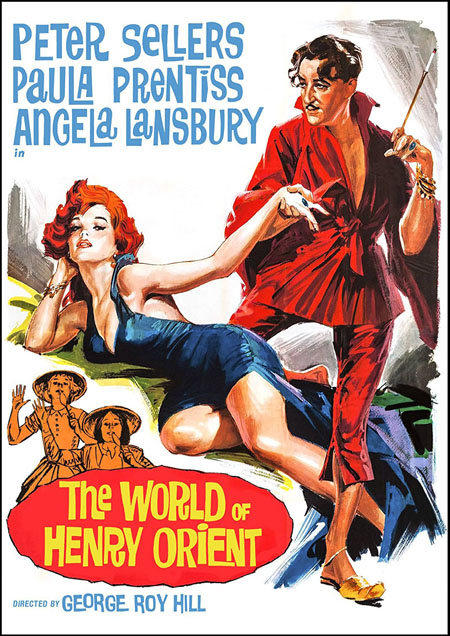
“SCHOOLGIRL CRUSHEDâ€
By Raymond Benson
George
Roy Hill’s 1964 comedy, The World of
Henry Orient, is based on a novel by Nora Johnson that fictionalizes her
own experiences as a schoolgirl in New York City when she and a friend
allegedly had crushes on pianist Oscar Levant. She and her father, Nunnally
Johnson, adapted the book to screenplay.
It’s
the story of two mid-teens, competently played by newcomers Merrie Spaeth
(“Gilâ€) and Tippy Walker (“Valâ€), who attend a private girls school in the
city. Gil’s parents are divorced and she lives with her mother and another
divorcee in a nice Upper East Side apartment. Val’s parents are still married,
but unhappily, and they’re constantly traveling the world for her father’s (Tom
Bosley) business. This leaves Gil and Val to indulge in precocious imaginary
“adventures†around the city.
Val
develops an infatuation on eccentric womanizing concert pianist Henry Orient
(Peter Sellers) and the pair stalk him around town as he has first an affair
with a married woman (the delightful Paula Prentiss) and later Val’s own snobbish
mother (Angela Lansbury). Orient spots the two girls several times, leading him
to have paranoid fantasies that they are spies working for the cuckolded
husbands. In short, the youngsters’ shenanigans end up running the naughty man
out of town.
The
movie is really an odd little coming-of-age tale concerning children from
dysfunctional or broken homes. It works well enough (it was positively received
upon release), but it’s hardly a “Peter Sellers movie,†as the publicity
campaign promises. Sellers, who receives top billing, is barely a supporting
player in the story, although he is indeed very funny. His antics with Paula
Prentiss—a highly underrated comic actress who shines in her brief moments—are
enjoyable, and the crazy Carnegie Hall concert in which he performs his latest
avant-garde composition is hilarious—worth the price of admission.
Mostly
the film focuses on the two girls, who, for their debut performances, aren’t
bad at all, but don’t quite have the screen charisma to elevate the film to
intended heights (Spaeth never acted again; Walker went on to do some
television and a couple of other films before retiring from show business in
1972).
The
film might be a delight for anyone who knows New York City. As the picture was
made on location, it’s a virtual tour guide for the sights, mainly Central Park
and the Upper East Side. Elmer Bernstein’s lively score is memorable—especially
the catchy main title theme and Orient’s wacky P.D.Q. Bach-like “symphonyâ€
(that includes a fog horn).
Kino
Lorber’s DVD release comes with no supplements other than trailers for other
releases by the company. The video image is fine.
Probably
little-seen today, The World of Henry
Orient is an interesting time capsule from its era, most significant for
being one of three 1964 pictures in
which Peter Sellers starred. He was, arguably, at his peak.
CLICK HERE TO ORDER FROM AMAZON